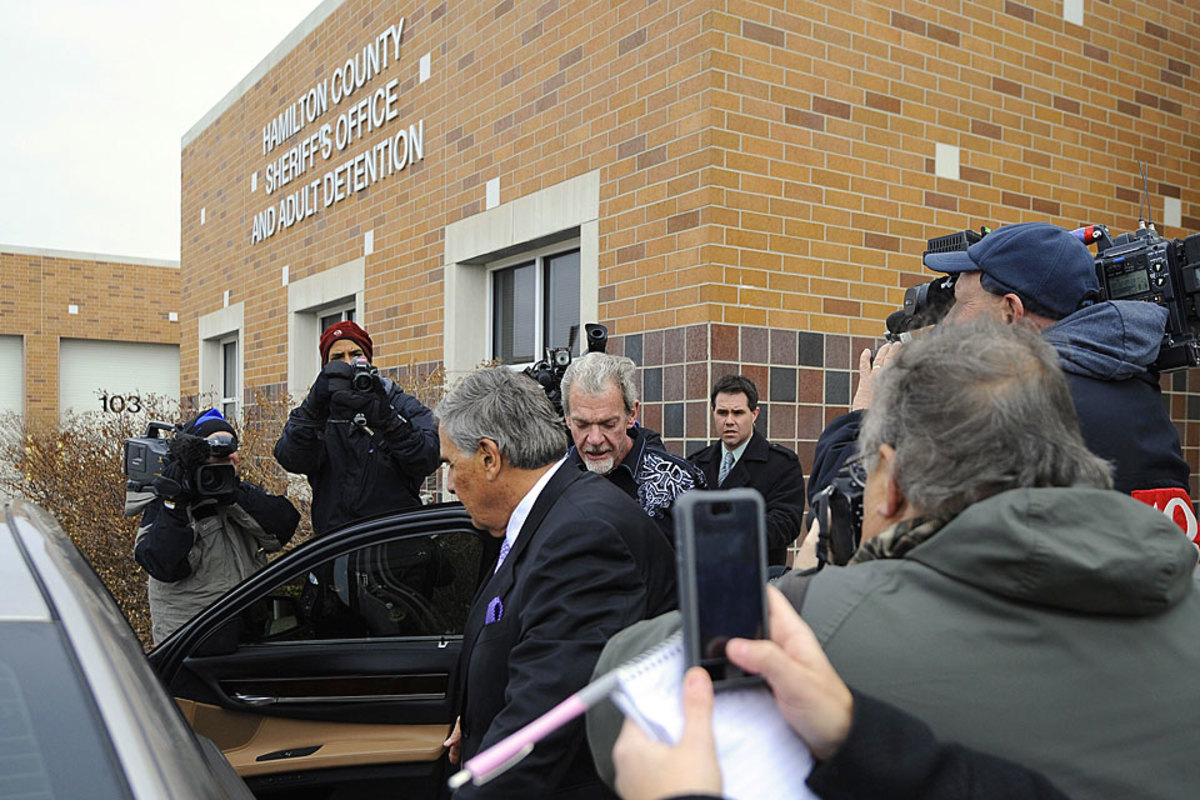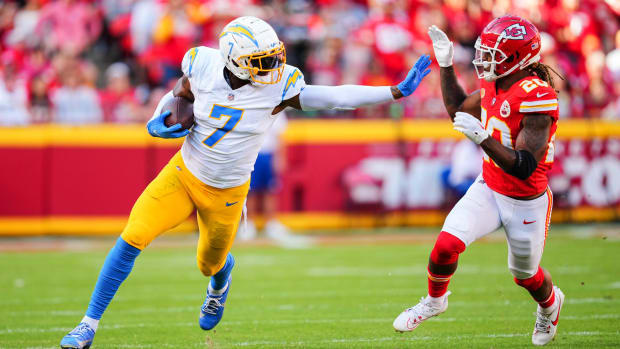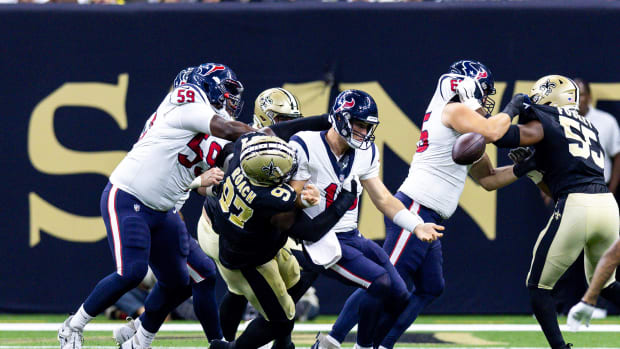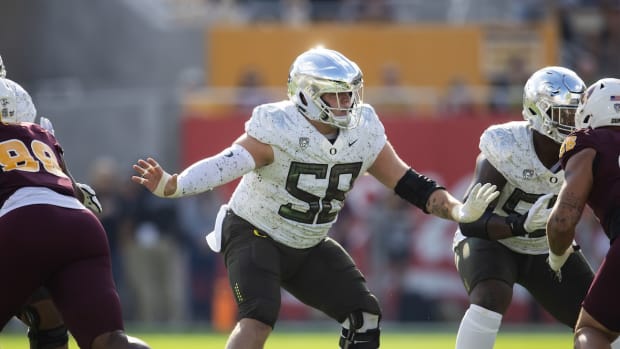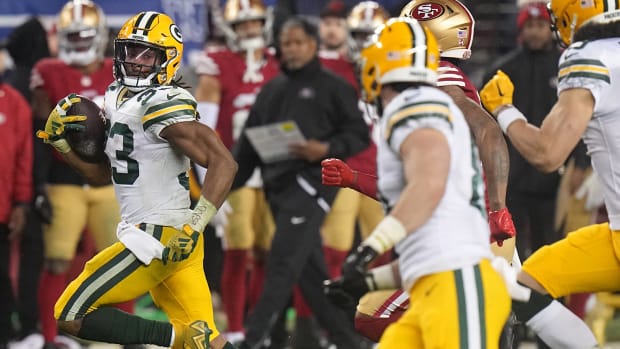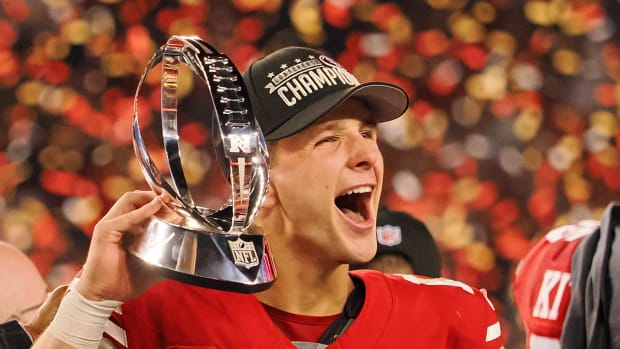Goodell’s Irsay Problem
I’ve been listening to people in and out of my business talk about the Jim Irsay story over the past 24 hours and I’ve heard a couple of themes: This is going to be a very tough disciplinary call for Roger Goodell because Irsay’s one of his bosses ... and ... the players are going to be watching this case to see if Goodell is as tough on one of his 32 employers as he is on the players.
I’m not buying that this decision will keep the commissioner up at night. I don’t think this is going to be a tough call for Goodell.
History says it won’t be, even though Goodell has never had to discipline an owner for substance abuse or driving while impaired in his eight years on the job. Irsay was arrested in Indiana early Monday and charged with operating a vehicle under the influence. He was also charged with four felony counts of possessing a controlled substance; police found prescription drugs that weren’t prescribed to him in the car he was driving. Irsay is due in court next week to address the charges.
This is the sort of case few commissioners have had to deal with. The fact that Irsay has a substance-abuse problem that results in such a public black eye for the league and for himself is a sad story, and it could have been a tragic one: Who knows if this was the first time that Irsay—allegedly—has driven while impaired? He said in a 2012 interview about his sobriety that he has spilled more alcohol than the interviewer has drank, a line many in recovery have used. But Bob Kravitz of the Indianapolis Star quoted a source with knowledge of Irsay’s situation as saying, “He’s a sick, sick man. He desperately needs help.”
The first step here will be for Irsay to deal with the law, and to get the help he needs. Then Goodell will step in with discipline. An owner is subject to the personal conduct policy the same as a player. What we don’t know right now is whether Irsay has done anything prior to this point to be put on notice by the league. That, obviously, would make the potential league sanction worse.
Goodell and Irsay before the start of Super Bowl XLIV. (David J. Phillip/AP)
But Goodell’s history shows he's short on sacred cows. I once saw an exasperated Dan Rooney, the Steelers owner who was Goodell’s biggest champion when he ran for commissioner in 2006, tersely complain to him that he was too hard with his fines on Pittsburgh players. Patriots owner Bob Kraft remained a close ally after Goodell—rightfully—took a first-round pick away from New England and fined Kraft’s coach and organization $750,000 over Spygate. Goodell fined the late Tennessee owner, Bud Adams, $250,000 for making an obscene gesture to a crowd in Nashville in 2009. And he stripped New Orleans owner Tom Benson of his coach for the 2012 season, and his GM for half the season, after a long investigation into a bounty system with the Saints.
The closest case to Irsay’s was in Detroit in 2010. Club president Tom Lewand was arrested for driving while intoxicated, and Goodell gave him a $100,000 fine and a 30-day suspension from his job (later reduced to 21 days because Lewand complied with all the recovery steps the Lions and the league mandated).
Goodell knows everyone is watching the Irsay case. He knows he’s going to have to be compassionate but tough on Irsay. I think he will be. I think anyone who can strip a playoff team of its coach for a year isn’t going to have a hard time disciplining an owner if he’s found guilty of crimes as serious as felony drug possession and driving under the influence.
What’s the right punishment, if Irsay is guilty? A fine, certainly. But I can tell you from knowing Irsay that a fine won’t be such a big deal. Banning him from being around his team for a period of time would be much worse. Irsay loves being around his team. He loves being an owner. He loves the life, and what he can do for people because of that life. For goodness sakes, he tweets transactions. He gives out tickets in Twitter contests. When a former Colts beat writer, Len Pasquarelli, was ready to be discharged from a Phoenix hospital after bypass surgery while covering the Super Bowl in 2008, Irsay sent word that he wanted to ferry Pasquarelli home to Atlanta on his private plane, with a nurse on board. On Monday, Pasquarelli wrote about that for a story on his site, pickthedraft.com, just to show people that Irsay is a big-hearted guy who, obviously, has some demons.
I think a fine plus a suspension from any team-related activities will likely be Goodell’s discipline if the charges against Irsay are true. And if true, the discipline will certainly be justified.
Now onto your email ...
* * *
PHYSICAL ISSUES. Can you elaborate on the Rodger Saffold situation? It would seem to me that he would have some footing for filing a grievance against the team if the team doctor's examination didn't agree with multiple other doctors that are just as qualified to evaluate his labrum. Was the agreement verbal or written pending the physical? What are the player's rights in this situation when it ultimately cost him significant dollars?
— Todd, Albemarle, N.C.
Every time an NFL team reaches a contract agreement with a player, it is subject to that player passing the team’s physical exam. A team doesn’t have to tell you why it might be failing a player when another team has passed the player. For instance, when Anthony Munoz came out of USC, he was flunked on the physical by a lot of teams because of a questionable knee. So even though it might appear to be unethical, the Raiders don’t owe Saffold or his agents an explanation other than to say, “He flunked our physical.” However, I feel the way Saffold’s agents feel: You can always find a reason to flunk a guy on a physical if you really want. And I think there is some evidence to suggest that the Raiders wanted to fail him on the physical.
THE RAIDERS MESS.I realize money talks and many players will go ANYWHERE to get the money, especially since the NFL player shelf life can be so short. But how many agents will tell their players (quietly), “I am going to look everywhere but Oakland because that franchise is a mess, has been a mess and does not look like it will be cleaned up soon.” And how do the Raiders change that perception?
— Doug, Atlanta
TALK BACK
Have a question for Peter King? Send it along, with your name and hometown, to talkback@themmqb.comand check back to see if it’s included in next Tuesday’s mailbag.
That’s a great question, and I don’t have a great answer unfortunately. The one thing I would say is that I think it is vital that very soon the Raiders get a long-term quarterback and stop scotch-taping that position together from year to year. This team right now needs to figure out if it would be more well-advised to take a quarterback over a left tackle with the No. 5 pick. E
verything flows from quarterback and coaching that position well. Now, if you’re not sure about the quarterback, then go ahead and take a long-term left tackle.
As far as the Raiders' inability to win consistently in this environment, my feeling is that there have been too many changes too often across the board in the organization. As we’ve seen throughout the past few years in the NFL, consistent change rarely leads to consistent winning. So I wouldn’t think of cleaning house right now, and I would hold on to Reggie McKenzie for as long as I have faith in him to build a strong long-term base of my team.
MOTIVATING FACTOR. As a Bear in 2013, Julius Peppers had 7.5 sacks, seven games with one tackle, and one game with none. During his Bears career he raked in $54 million. It wasn’t Peppers’ fault that former GM Jerry Angelo and Coach Lovie Smith wildly overpaid him to save their own jobs in 2010, but it was his fault that he disappeared for so many games. While he didn’t have a nickname here, “The Invisible Man” would have fit.
In free agency the question remains: how can teams get maximum effort from players after they’ve signed contracts with huge amounts of money up front? The final years of long-term deals are seldom reached, of course, but once the signing bonuses are banked, too often that’s a signal for some players to go on cruise control.
In Peppers’ case, it’s another new team and another big payday. Regardless of the incentives in his contract, he already has his cash up front. Will Packer fans also be left wondering when his play will equal his pay?
— Jay, Chicago
I think you raise a very interesting question about motivation of players after they’ve signed big contracts, and I believe that’s not only an issue for veteran free agents, but also for rookies. It’s a big reason NFL owners were so convinced that they had to do something about rookie salaries before the 2011 Collective Bargaining Agreement. And I think it’s the most difficult factor when a team is investigating a player—how do I know that I’m getting the great player that I saw on tape, and not someone who will cruise because he got his money?
I’ve watched Peppers a lot over the years. I can’t say that I watched him individually a lot last year, but I have the impression that he’s still an effort guy, but some of his athletic skills are declining, as they would with anyone who’s played as much as he has in the NFL. Now, Ted Thompson does not give out charity contracts. So I think he still sees Peppers as a guy who can make an impact on a defense that needs one.
































